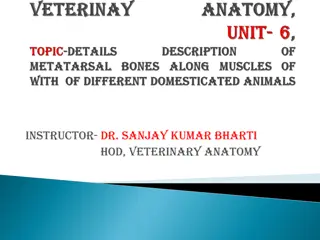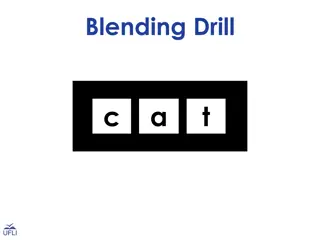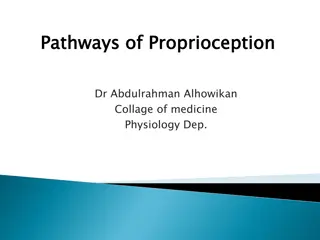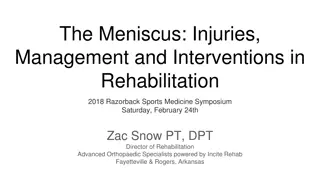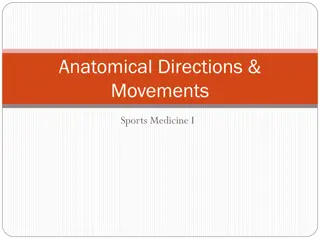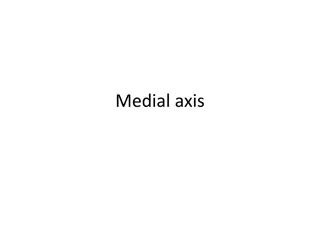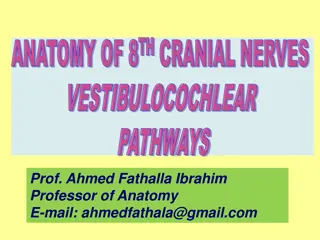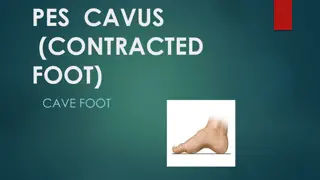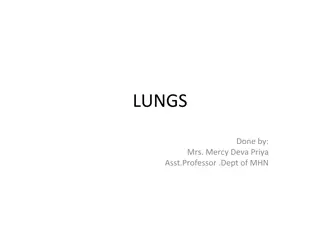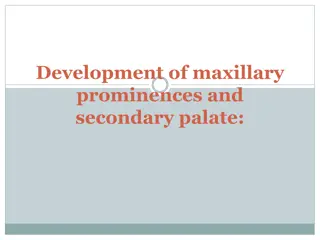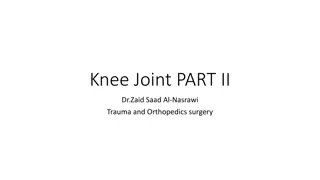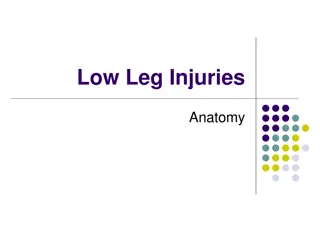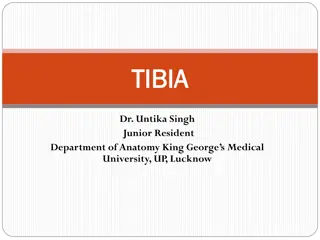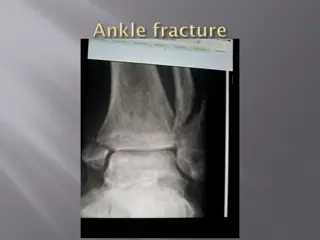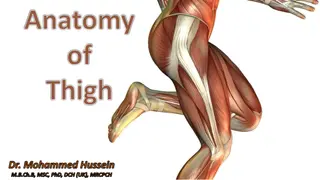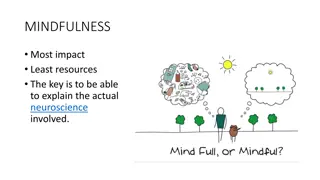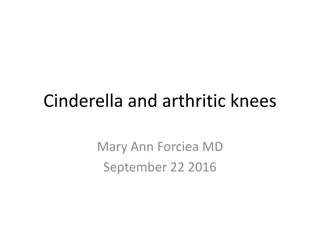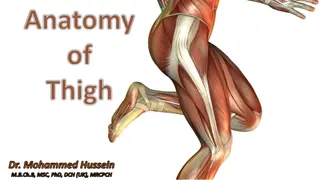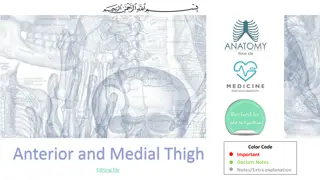Phonics Practice Activities for Elementary Students
Engage elementary students in phonics practice with various activities like identifying initial, medial, and final sounds, blending phonemes to form words, and changing sounds to create new words. The provided examples and word lists enhance students' understanding and application of phonics concept
6 views • 14 slides
Veterinary Anatomy of Ox Metatarsus Bones
The metatarsus bones of an ox consist of fusion of large and small metatarsal bones. The large metatarsal bone has distinct features at its proximal and distal extremities, while the small metatarsal is disc-shaped and located at the postero-medial aspect. The ox also has three metatarsal bones, one
0 views • 18 slides
Blending Drill for Phonics Practice
Engage students in a fun and interactive blending drill activity to enhance phonics skills. This resource includes grapheme cards for practicing initial, medial, and final sounds, allowing students to build and blend words. Explore a variety of word changes and continue the learning process with eng
0 views • 9 slides
Understanding Proprioception Pathways in Physiology
This information delves into the intricate pathways of proprioception, focusing on the somatotopic organization of ascending sensory pathways, types of receptors involved, dorsal column tracts like gracilus and cuneatus, spinocerebellar tracts, and the role of the cerebral cortex in perceiving propr
0 views • 22 slides
Understanding Meniscus Injuries: Anatomy, Evaluation, and Management
Explore the intricate details of meniscus anatomy, including the structures, attachments, and functions of the medial and lateral menisci. Learn about the mechanisms of injury, diagnostic approaches, operative and non-operative management strategies, and the importance of rehabilitation in restoring
1 views • 74 slides
Understanding Anatomical Directions and Movements in Sports Medicine
Anatomical directions play a crucial role in explaining the precise location of body structures in relation to each other. They are utilized regardless of the actual position of the body, with terms like superior, inferior, anterior, posterior, medial, lateral, proximal, and distal aiding in clear c
0 views • 38 slides
Understanding the Medial Axis in Geometry
The medial axis in geometry is a fascinating concept related to Voronoi diagrams and maximal empty disks. Explore how the medial axis is constructed, its significance in the study of polygons, and its applications in modeling and algorithms. Learn about associated exercises and different algorithms
0 views • 12 slides
Auditory Pathway in the Brain: Nuclei, Pathways, and Connections
Explore the anatomy of the 8th cranial nerves, specifically the auditory pathway in the brain. Learn about the nuclei related to vestibular and cochlear nerves, their types and locations, along with descriptions of the vestibular and auditory pathways. Discover the primary auditory cortex, medial ge
0 views • 23 slides
Understanding Pes Cavus: Causes, Symptoms, and Treatment Options
Pes Cavus, also known as contracted foot or cave foot, is a foot deformity characterized by an elevated medial longitudinal arch, causing the forefoot to be lower than the hindfoot. This condition can lead to pain, clawed toes, and other complications. Treatment options include orthotics, exercises
0 views • 7 slides
Understanding the Anatomy of Lungs
The lungs, vital organs of the respiratory system, consist of two cone-shaped structures with apex, base, costal, and medial surfaces. Positioned in the thoracic cavity, they are associated with the heart, great vessels, and other structures in the mediastinum. The right lung has three lobes, while
0 views • 16 slides
Understanding Glottalisation of /t/ in English Phonology
Exploring the phonological process of glottalisation affecting the /t/ sound in English, focusing on intervocalic environments and beyond. The case study delves into word-final and word-medial positions, highlighting nuances in pronunciation and teaching points for syllable stress and articulation c
0 views • 13 slides
Development of Maxillary Prominences and Secondary Palate in Embryonic Development
New outgrowths from the medial edges of the maxillary prominences form the shelves of the secondary palate. Fusion of these palatal shelves involves complex cellular changes, such as elevation after the withdrawal of the tongue and alterations in epithelium leading to adhesion and fusion. The fate o
0 views • 23 slides
Managing Cyclic Esotropia in a 6-Year-Old Child: A Case Report
A rare case of cyclic esotropia in a 6-year-old child is presented, highlighting the diagnosis, management, and successful outcome post bilateral medial rectus recession surgery. Primary cyclic esotropia, common in hyperopic children, was effectively treated with horizontal muscle surgery, leading t
0 views • 6 slides
Understanding the Menisci of the Knee Joint
Magnetic Resonance Imaging (MRI) is crucial in assessing knee joint internal derangements, including the menisci. These C-shaped structures play a vital role in providing stability, distributing weight-bearing strain, and facilitating joint movement. The medial and lateral menisci have distinct atta
0 views • 16 slides
Understanding Low Leg Injuries and Anatomy
Explore the anatomy of the lower leg, focusing on common injuries like shin splints. Learn about muscles, bones, and bony landmarks involved in conditions such as medial tibial stress syndrome. Discover the causes, symptoms, and treatments for these issues.
0 views • 10 slides
Comprehensive Learning Session on Tibia Anatomy
Explore the intricate details of tibia anatomy in this educational presentation by Dr. Untika Singh from King George's Medical University. Learn to identify the tibia, understand its different parts, surfaces, and attachment points, and grasp its significance as a weight-bearing bone in the leg. Div
0 views • 25 slides
Understanding Ankle Injuries and Treatment Options
Explore the anatomy of deltoid ligaments, fibula, medial malleolus, and posterior malleolus in ankle injuries. Learn about deformities, swelling, and bruises associated with these injuries. Discover diagnostic techniques like radiographs and Lauge-Hansen classification. Delve into non-operative and
0 views • 15 slides
Comprehensive Overview of Thigh Anatomy by Dr. Mohammed Hussein M.B.Ch.B, MSC, PhD
Dr. Mohammed Hussein provides a detailed exploration of the anatomy of the thigh, covering regional anatomy, connections, compartments, and cutaneous nerves. The discussion delves into the front and medial aspects of the thigh, offering valuable insights for medical professionals and enthusiasts ali
0 views • 74 slides
Unleashing the Power of Mindfulness for Cognitive Enhancement
Explore the fascinating realm of mindfulness and its remarkable impact on cognitive function. Delve into the neuroscience behind mindfulness practice, uncovering how it affects brain regions like the medial prefrontal cortex and the hippocampus. Discover the two distinct networks in the brain, the D
0 views • 13 slides
Unloading Shoes for Knee Osteoarthritis: A Clinical Study
In a study by Mary Ann Forciea MD, the use of unloading shoes was explored to manage knee osteoarthritis. The research focused on reducing pain and improving physical function in individuals with medial compartment disease. The randomized controlled trial conducted in Melbourne from 2013 to 2015 sho
0 views • 12 slides
Comprehensive Overview of Thigh Anatomy and Functions
Explore the detailed anatomy of the thigh, focusing on the medial compartment and structures like Gracilis, Adductor Magnus, and more. Understand the innervation, functions, and vascular supply of these thigh muscles. Dive into the complexities of the obturator artery and its branches as they relate
0 views • 23 slides
Muscles of the Anterior and Medial Thigh Anatomy Overview
Explore the anatomy of the muscles in the anterior and medial compartments of the thigh, covering origins, insertions, nerve supplies, and actions. Learn about the divisions, compartments, and common muscles responsible for knee extension and hip flexion. Discover the structures of the femoral trian
0 views • 18 slides

